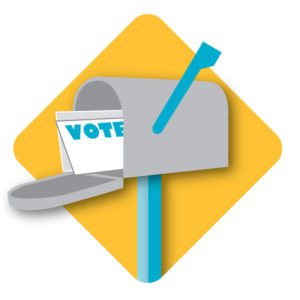 In 2018, the voter initiative that ended partisan gerrymandering also allowed any Michigan resident to vote by absentee ballot. In the next presidential election, four out of five Washtenaw County voters took the option.
In 2018, the voter initiative that ended partisan gerrymandering also allowed any Michigan resident to vote by absentee ballot. In the next presidential election, four out of five Washtenaw County voters took the option.
With the Covid-19 pandemic peaking and no vaccines yet available, “We saw this dramatic turn towards absentee voting in 2020 for obvious reasons,” says county election chief Ed Golembiewski. But after falling to 17 percent that year, in August’s primary the share of people voting in person more than doubled, to 42 percent.
That’s left election officials wondering how people will choose to cast their votes in November. The uncertainty is “essentially requiring city and township clerks to plan for both high numbers of absentee votes,” Golembiewski says, “but also prepare for the strong likelihood that it’s going to be more of a balance between in-person and absentee voting.”
That means hiring more people to work the polls which is “expensive,” Golembiewski says. “If you talk to Jackie [Beaudry, the city clerk] I imagine she’s got plans to beef up the number of temporary seasonal workers on staff. The city had a lot of seasonal folks in 2020, close to twenty, to deal mostly with absentee ballots!”
With no presidential contest, turnout this November will be down considerably from 2020. But Golembiewski doesn’t think voters will stay home because they don’t trust in the election’s integrity. Even “here in Washtenaw County, where trust seems to be higher in the democratic process and the institutions, we have some skeptics that reach out to us,” he says—but not “the same constant questioning and quite literally the threats and intimidation that some other election officials are” experiencing.
That’s not to say that former president Donald Trump’s insistence that he didn’t really lose has lost its power. “Any folks that were skeptical then are still skeptical,” Golembiewski says.
“Leading into the August primary, we heard from poll workers that were concerned especially about firearms in polling places and folks turning out to disrupt the process and make their lives difficult. We didn’t see it this August, [but] we prepare for it every time.”

